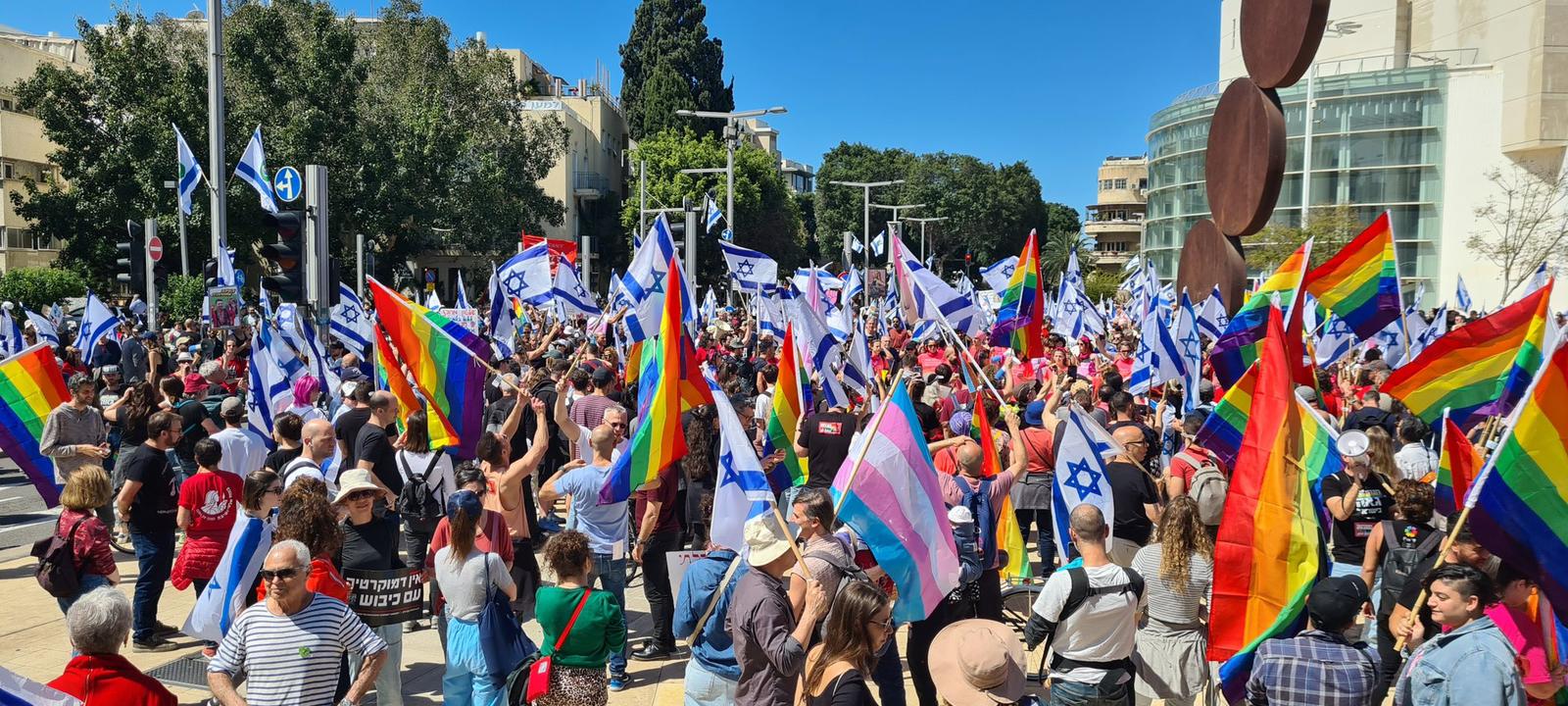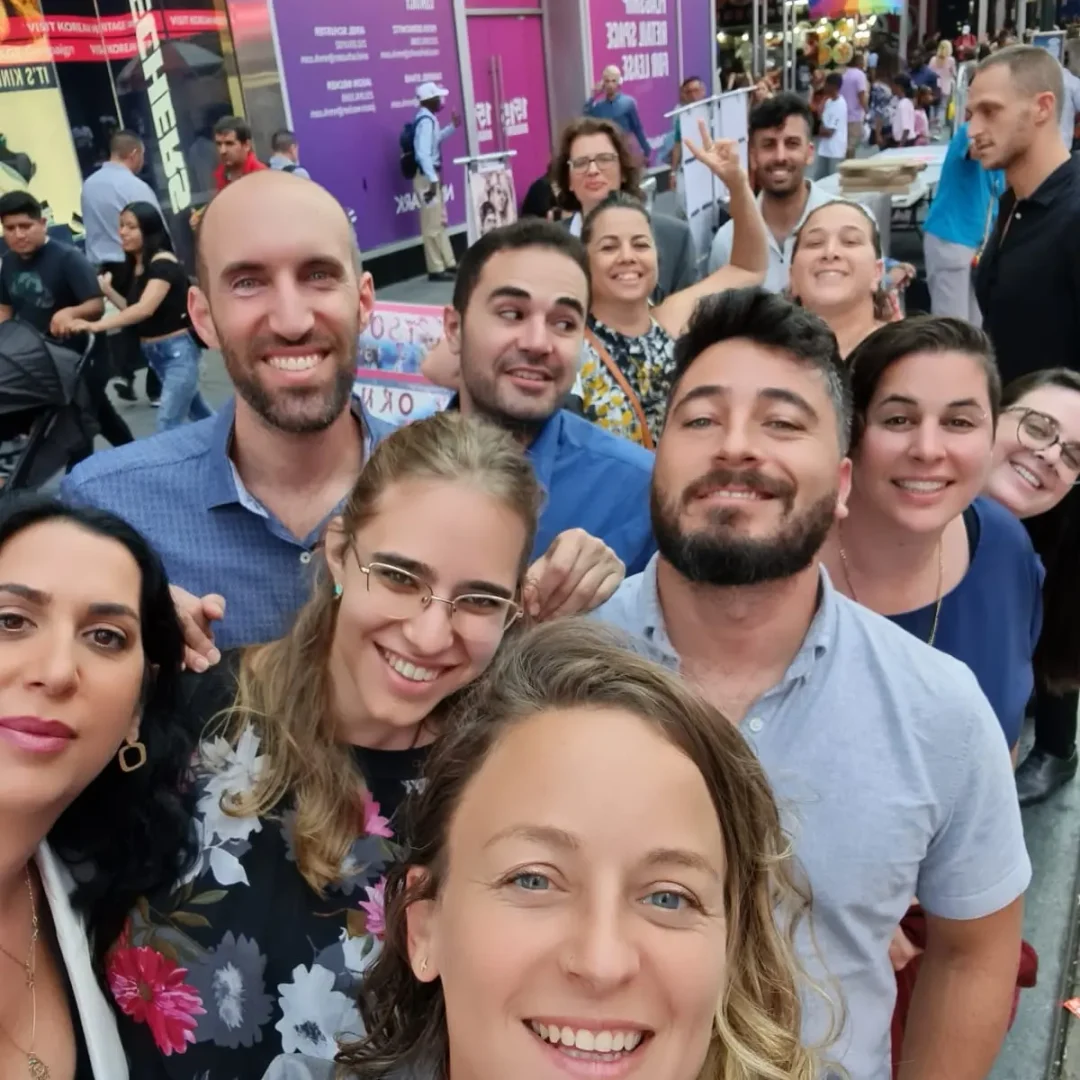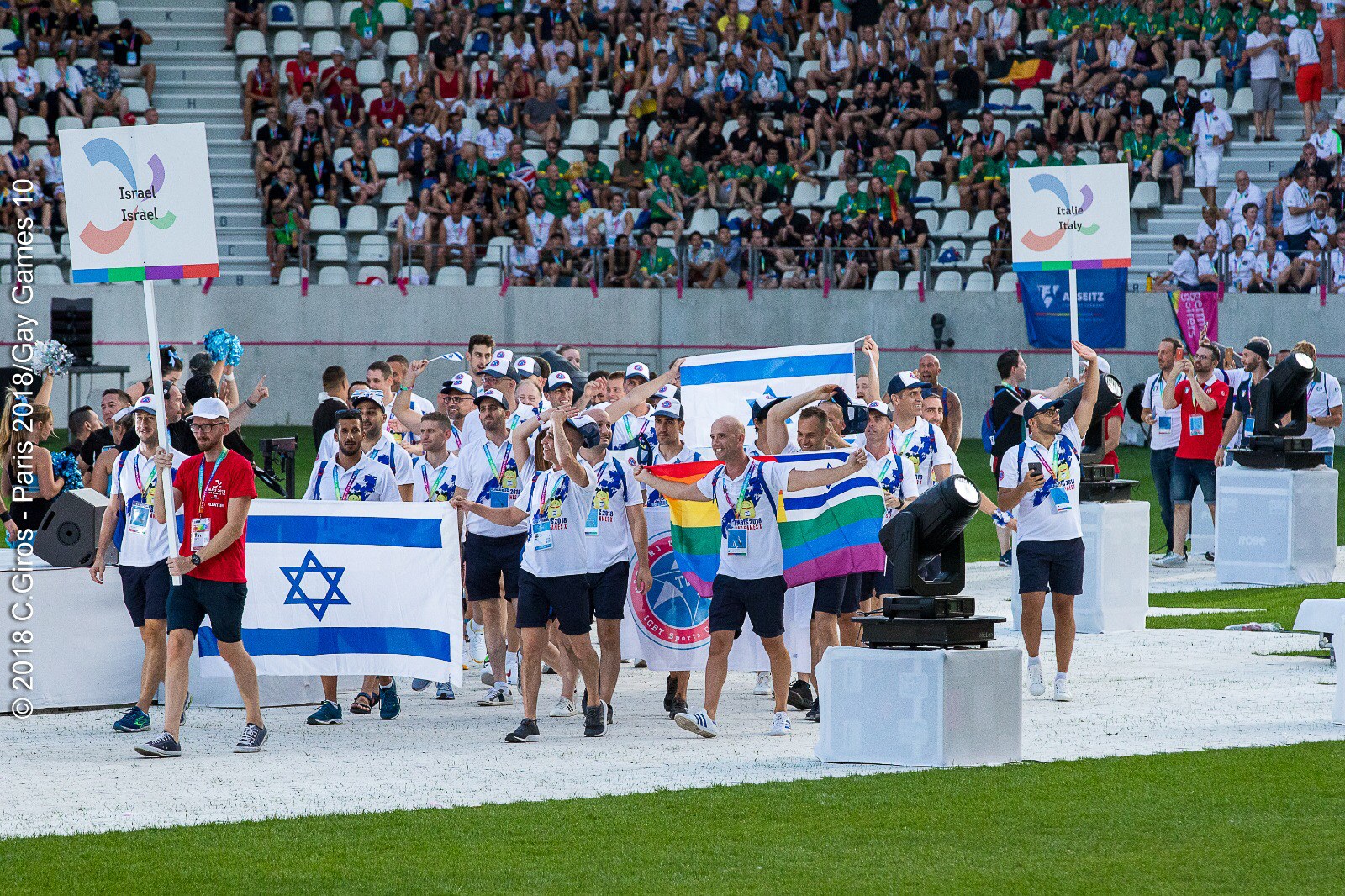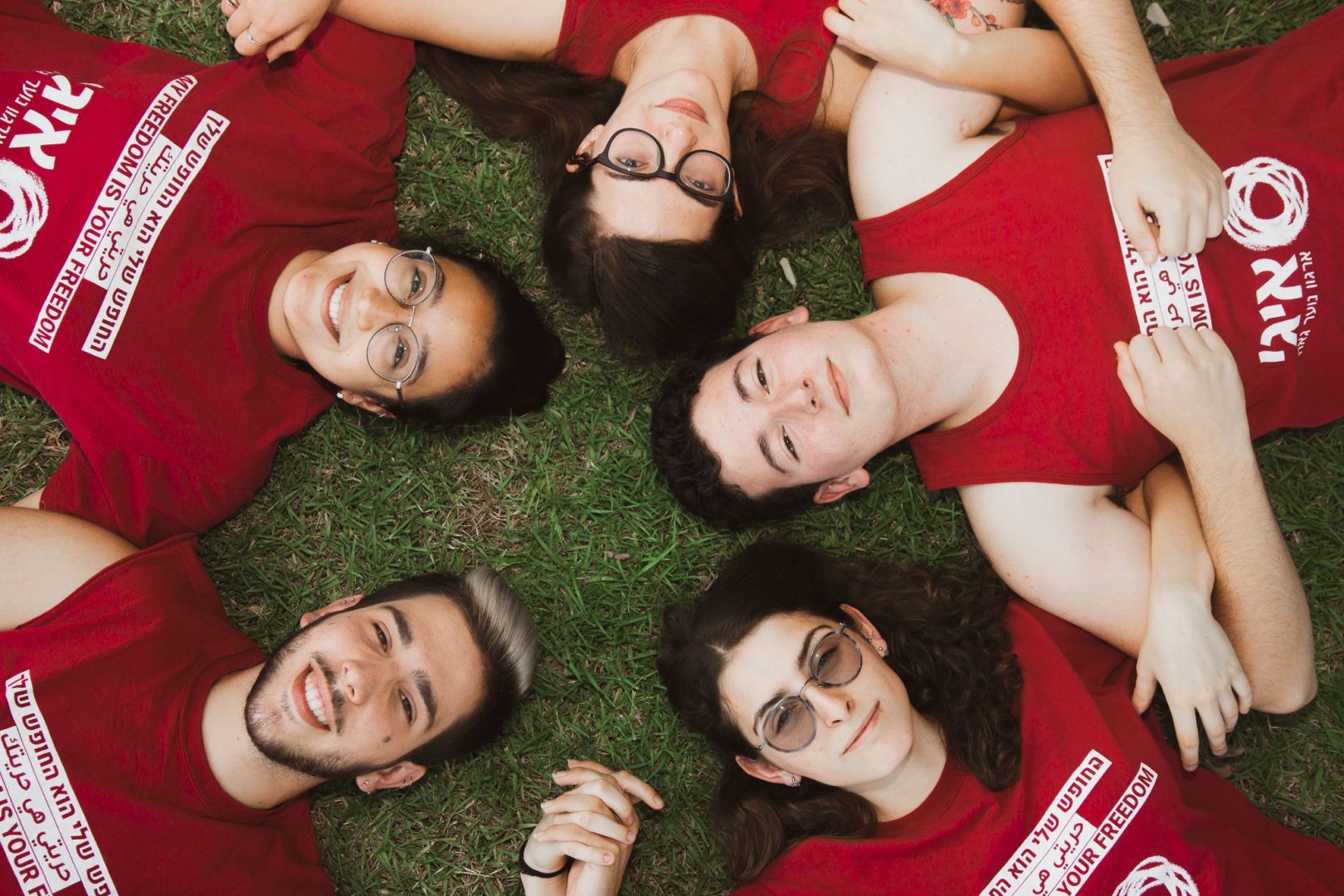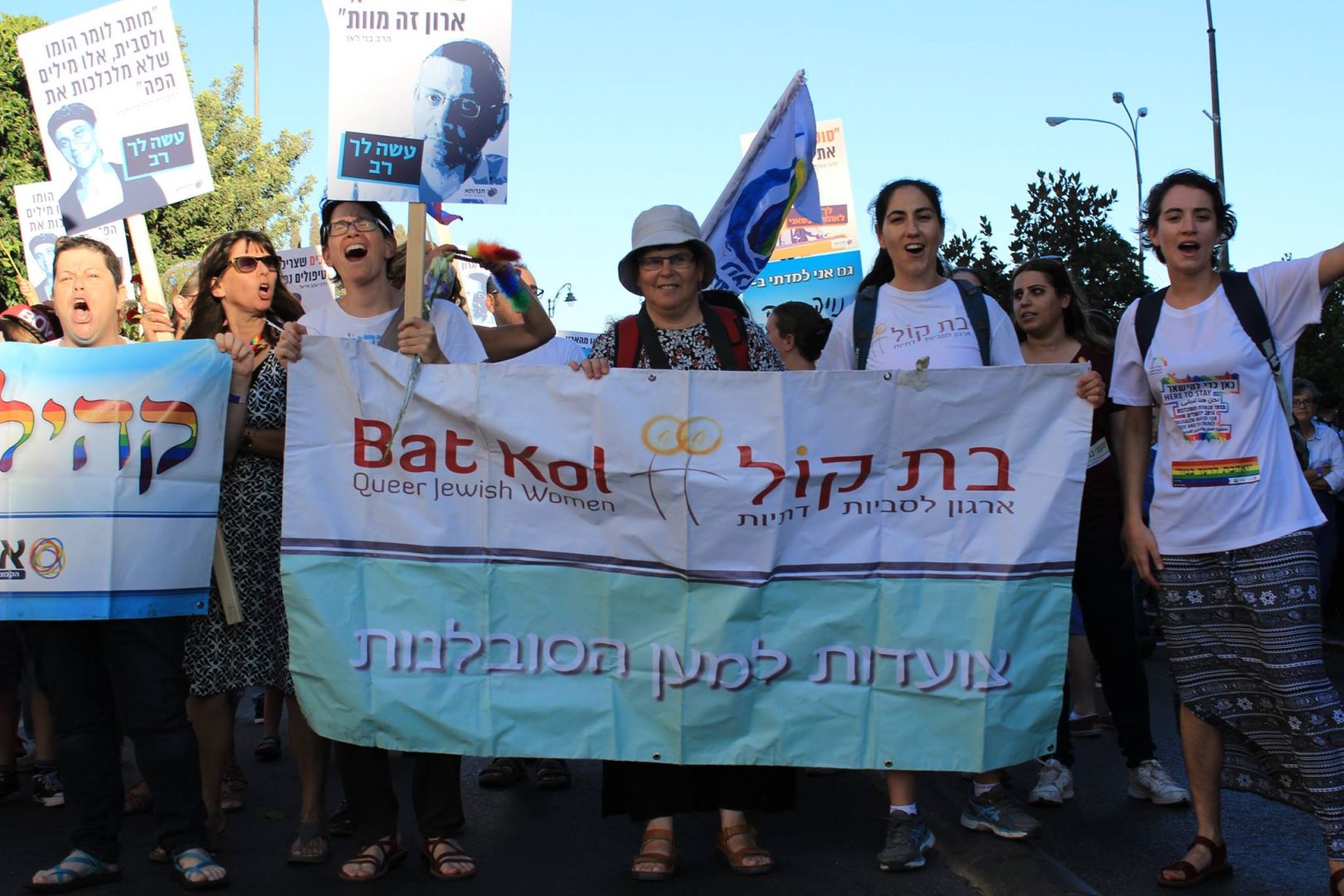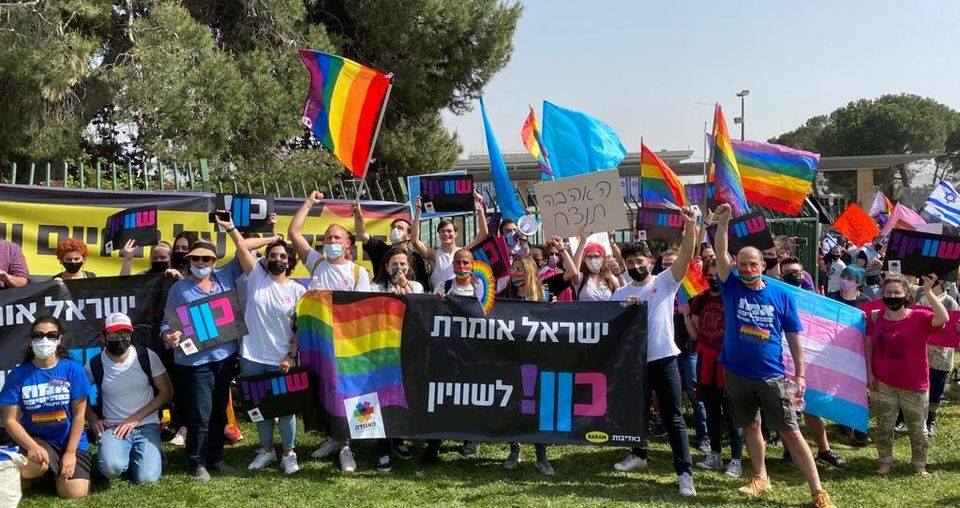A Story of Resilience
URGENT: SUPPORT THE ISRAELI LGBTQ COMMUNITY TODAY
=
The Israeli LGBTQ Community is a diverse, vibrant, and inspiring community that has fought for its rights since its inception. Jews and non-Jews, Secular and religious, from all the political spectrum and all parts of the country create this community. For many years, the community has fought for recognition and equal rights. Thanks to their ongoing work, with the help of the court and allies in positions of power, the community gained many rights.
The fight is far from complete, and there are still many issues and obstacles the Israeli LGBTQ Community deals with. Nevertheless, the story of the Israeli LGBTQ community is an inspiring story of resilience.
We invite you to learn more about the history of the Israeli LGBTQ Community in the timeline below. We also invite you to visit our learning center or learn about our Impact Grants.
-
1924
June 30 – Homosexual literary writer and journalist Yaakov (Jacob) Israel de-Haan is assassinated in Jerusalem by the Jewish paramilitary organization Haganah for what was believed to be his anti-Zionist political activities and contacts with Arab leaders. It is the first ever political assassination in Israel.
-
1936
Homosexual literary writer Mordechai Langer, who was Kafka’s Hebrew teacher, makes Aliyah and moves to Israel. Though Israel’s Hebrew Writers Organization refuses to print his first book, Langer manages to delineate a specifically homosexual Jewish identity by renegotiating the relationship between homosexuality and Judaism and by adumbrating a history of “gay” Jews.
-
1947
Beginning of secret homosexual activity in London Garden, Tel Aviv’s Tayelet and the bar in the Armon Hotel, Tel Aviv.
-
1960
February: The first book in Hebrew about gays and lesbians is released under the name “Hadavka’im” (free translation: ‘Those who do things to spite’) and describes the LGBT community in Tel Aviv. Following the book’s release, LGBT people were nicknamed “Davka’im”) for many years thereafter.
-
1961
March: First lesbian romance book in Israel, “Hatzolea” (‘The Limping’)
-
1962
February 7: The first article on the gay-lesbian community is published in the newspaper “Haolam Haze”. The new research on the community describes the various groups, their signs of recognition and a story about two men who tempted young guys to have sex. The newspaper is the first to deal with the subject which was then considered controversial and extreme.
-
1966
Michael Ohad starts the first ever annual gay party in the history of Tel Aviv, as a birthday party for Danny Lahman, and thereafter Lahman’s birthday party becomes an annual gathering. The couple Ronny and Johnny open their home for gay meetings every Wednesday.
-
1967
The literature magazine “Achshav” published a piece called “Niflaata” (‘Her Delightfulness’) by H. Yoav that was the first ever LGBT piece to be published in an Israeli magazine.
-
1968
First ever gay and lesbian club in a private apartment on Yordei Hasira st. in Tel Aviv, founded by Amir Sharon. The place is kept secret and invitations are sent personally.
The first two gay bars in Tel Aviv open: one in Yaffo and the other at the London Ministries (Ibn Gvirol Street).
-
1969
First theater play called “The Guys in the Havurah”, starring Oded Teomi.
-
1970
Marsha Friedman initiates the foundation of the first academic Zionist feminist women in Tel Aviv.
-
1974
‘The Masks Parade’ is initiated by Sivan Malkior. Twenty homosexual men (and one straight woman) walk around Rabin Square wearing masks, and demanding rights for homosexuals. The demonstration is caught on camera by the national news, and Malkior is interviewed without a mask.
-
1975
July 29 – Founding of the Agudah. Approximately 12 men decide to initiate “a national task force that will be recognized by the Israeli public and will officially represent the homosexual community.”
August – Foundation of “Israel Hospitality” formed to provide information for tourists and to keep in touch with international organizations abroad.
October 6- Israeli Ministry of Internal Affairs recognizes the Agudah, headed by Yaakov Pezi.
November 12 – First Agudah meeting, managed by Sivan Malkior
November 16 – Members of the Agudah meet MK Shulamit Aloni and discuss striking down the law that bans homosexual relations.
-
1976
February 2 – Avi Angel, Executive Director of the Agudah, is interviewed for the first time on TV, for a show called “The Third Hour,” to talk about being homosexual and the life of the community. Besides Avi, there are other guests on the show- but they are interviewed as “shadows,” with false names and distorted voices.
February 29 – The first general gathering of the Agudah at Tzavta hall in Tel Aviv. Sivan Malkior is elected to be Executive Director, and all 5 members of the board are reelected. Malkior resigns from his role after a little more than a year.
April – The Agudah rents an office in a basement on Ben Yehuda street and starts an ongoing discussion and “an open house,” as well as parties, for men and women on Fridays, and for women only on Saturdays. Jonathan Danilovitch, Dan Lahman and Dubi Barkan initiate the Aguda’s lecture series. Representatives of the lecture series start to give lectures and workshops, especially in Kibbutzim, and use the money earned for funding the Aguda. In 2001, the lecture series is given the name Hoshen, Education and Change.
-
1977
September 17 – The Aguda sponsors “Aliziada,” the first ever pride event in Israel, in Hayarkon Park. The event marks the first anniversary of the Aguda.
-
1978
May – During the first feminist convention in Beer Sheva a group of lesbians forms ALEF – a lesbian feminist organization. The organization organizes parties and lectures.
-
1979
The forth international convention for Jewish gays and lesbians was held during the summer, including participants from New York’s CBST. The “Marina” Hotel and Kibbutz Ma’ale Hachamisha guest house cancel the reservations for accommodations, for fear of losing their kosher certificates. The 30-60 convention participants demonstrate in Rabin Square, supported by the Lesbian Feminist Organization. The group also plants a 3000 tree forest in the south of Israel, but until 1992, Keren Kayemet Le’Israel refuses to put up a sign with the real identity of the donors.
-
1981
The first convention of the Aguda occurs in Kibbutz Ramot Rachel
The first community magazine, “Nativ Nosaf” (“An Additional Path”) is published, with Moshe Rosenbaum as Editor in-Chief.
-
1982
HaKav Halavan is launched – Dan Lachman of the Aguda launches “The White Line,” a help line for gays, lesbians and their families. Volunteers try to help callers who struggle with problems in their lives, but also give information on activities and programs for gays and lesbians.
Itzik Nini opens the first ever party-line for drag performances at Tel Aviv’s Penguin Club.
June- The Aguda receives government approval to be listed in the non-profit organizations list. To celebrate, the Aguda holds a special event in Tzavta Theater, where the new executive director, Amotz Boneh, was elected.
-
1983
First gay-themed movies – the first feature film by Amos Guttman , “Nagua,” is released almost parallel to Ron Assulin’s short film “Tzel Acher” (‘Another Shadow’). The movies are banned from screening, which caused a public controversy.
“The Blue Notebook” is published: a 16-page booklet that declares the rights of homosexuals to live with dignity, with additional facts and information on legal, psychological, political, sociological, historic and religious views of Israel on the subject compared to other countries.
-
1984
The organization “Woman to Woman” is formed in Haifa. It’s not a lesbian-only organization, but it includes and acknowledges lesbians and sees them as an integral part of the organization.
-
1985
Dan Lachman and friends launch Israel AIDS Task Force. The first activities include an HIV test at the Theater Club, then the biggest gay club in the country.
-
1986
First gay poetry book is published: “Columns for a Bad Breakup” by Ilan Sheinfeld
Ayelet Menachemi’s documentary “Orvim” (‘Scare Crows’), about homosexuals in Israel, is screened.
A gay-themed column starts in a newspaper, titled “Banim” (‘boys’) by Gal Uchovsky under the pen-name Moshe.
First gay-themed play, “Mizmor le David” by Tamor Greenberg, is included at the acclaimed Acco Theater Festival.
-
1988
March 22 – The ban on consensual same-sex sexual acts is formally repealed by the Knesset, thanks to Shulamit Aloni.
Klaf (Lesbian Feminist Community) opens its Jerusalem branch.
Haifa court rules that a same-sex couple who separated are entitled to the same rights as a heterosexual divorced couple, in terms of separating the mutual belongings.
-
1989
Jonathan Danilovitch vs. El Al: Danilovitch demands that the Israeli Airline company will recognize his partner as a spouse entitled to the same advantages as heterosexual spouses of El Al workers.
June – first pride week celebrations, 20 years after Stonewall
Jonathan Danilovitch founds Tehila – an organization that supports parents of gay and lesbian children.
-
1990
The movie “After” represents Tel Aviv University at the International Student Film Festival and wins first prize. The movie, directed by Eytan Fox, is the first to deal with homosexuality and the army and wins Movie of the Year Award by Editors Guild Israel
The Tel Aviv court gives one of its first pro-LGBT rules, ruling against a pub owner who tried to cancel a rental agreement after discovering that the pub was going to serve LGBT people.
-
1991
A group of gay and lesbian students at the Hebrew University in Jerusalem launch the gay and lesbian student group “HaTa Ha’acher”
A gay and lesbian annual convention takes place at Bnei Dan hostel in Tel Aviv. During the convention The Aguda organizes workshops on the subjects of coming out, gays in the Bible, gays in poetry and more.
-
1992
Between 1989-1992, Otzma works on a correction of the Equality in the Work Place law so it will include LGBT people. It is assumed that this law has the best chance of passing, knowing that the Danilovitch case is being discussed in court.
The bill is presented by MK Ora Namir, prepared by attorney Dan Yakir from the Civil Rights Union, who dealt with the subject of LGBT rights during his Ph.D. studies in the United States. The bill was accepted in 1991 and became the Aguda’s best achievement to date. It became effective on January 2, 1992.
-
1993
February 2 – Uzi Even is elected to speak in the Knesset. He tells his personal story: after serving in the army for 15 years in a very discreet and important role, he was removed from the role and was defined as “dangerous to the safety of the state of Israel” because he was gay. Even’s story was the first ever story that shocked the Israeli public and raised sympathy for the community. Former Prime Minister Yitzhak Rabin began to get involved in changing the law to protect gays and lesbians in the army.
June 18 – The new army law becomes effective. It promises equality in recruiting LGBT people into the army. However, commanders were still obligated to report any knowledge of a gay or lesbian soldier in their units.
The first book about an alternative family is released: “Nimrod Gam ve Gam” (‘Nimrod This and That’) by Tamir Lahav and Izik Yosha.
June – First ever gay pride parade – Avi Soffer, then the Executive Director of the Aguda, and his partner Avi Robinstein, organize a parade of 14 vehicles that moved and honked along Dizengoff St., carrying rainbow flags. The parade continued to an event at Sheinkin Garden, where surprisingly a large number of gays and lesbians and their straight friends came to participate.
-
1994
January – The Aguda and Israel’s AIDS Task Force launch Bella Doeget, an educational organization for gays on HIV and AIDS.
July – For the first time in Israel’s history, gay and lesbian activists enter Yad Vashem, the national Holocaust Memorial site near Jerusalem, in order to hold a ceremony in memoriam of gays and lesbians who were persecuted during the Holocaust. They are attacked by right wing activists, and Avner Shalev, then Yad Vashem’s Executive Director, is interviewed on TV, blaming the community for being provocateurs.
November – Jonathan Danilovitz wins court case against El AL, which requires the Israeli airline to give his partner the same rights as partners of heterosexual workers at the company.
-
1995
Ministry of Interior approves same sex couples changing their last name to the same last name.
February – Tel Aviv University recognizes equal rights for same sex couples. Amit Kama gets pension rights as the partner of Professor Uzi Even. Uzi and Amit end up in 15th place in the power-couples list in 1995.
Amnon Rubenstein, Minister of Education, orders a brochure produced on same-sex orientation in order to educate Israeli students.
September – Bella Doeget organizes the first Wigstock in Tel Aviv
-
1996
Jewish Agency announces a new program to encourage Aliya of Jewish gays and lesbians.
Ezer Weizman, then-President of Israel, publishes a homophobic statement. The community organizes a demonstration in front of the President’s house on the same night. Four representatives from the community meet with him afterward, and he publishes an apology.
-
1997
First ever Drag Festival, which includes choosing Israel’s #1 drag queen, takes place in Haifa.
Gal Uchovsky becomes the first publicly out host on TV in a talk show called “the small circle”
February- Jerry Levinson and Ali Vardi launch The Open House for Pride and Tolerance in Jerusalem
June – first pride event in Jerusalem
-
1998
February 18 – A correction to “Lashon Hara” law, that forbids condemning a person for their sexual identity, passes in the Knesset
May – Dana International wins Eurovision for Israel
Tal Yaros- Hakkak wins an International Gay & Lesbian Human Rights Commission Award for her role in the fight for the rights of gays and lesbians
Channel 2 screens the Eytan Fox and Gal Uchovsky movie “Ba’al Ba’al Lev” (‘A Husband with a Heart’) on prime time TV. The film takes home the first prize at the New York International Gay and Lesbian Film Festival later that year.
June – First Gay Pride, in the format that is known today, was organized in Tel Aviv. Produced by Or Maroni-Pener, and with the participation and support of politicians and candidates for Tel Aviv City Hall
August – Israel participates for the first time at Gay Games. The Israeli delegation contains dozens of participants and wins 9 medals.
-
1999
Danny Kaplan releases “Yehonathan and Other Soldiers,” about homosexuality in the IDF
The Aguda changes its full name to the ‘Aguda for homosexuals, lesbians, bisexuals and transgenders in Israel’
June – Tel Aviv municipality cooperates and gives funds to the gay pride events for the first time
-
2000
The Knesset reduces the age definition of a minor, with whom consensual homosexual sex is allowed, from 18 to 16.
The Knesset passes a law that bans discrimination based on sexual orientation in giving services, entrance to public and entertainment facilities and supply of products.
May – Israeli Court decides to allow lesbian couples Nicole and Ruth to become mothers with equal rights and obligations to Matan, the biological son of Ruth. Before the court’s decision, Ministry of Interior insisted on not registering Nicole as Matan’s parent, because she is not his biological mother, despite the child’s adoption papers that were given to her in federal court in San Francisco.
-
2001
Moshe Katzav, president of Israel, meets with representatives of the LGBT community
First pride parades in Jerusalem, Haifa and Eilat.
Professor Uzi Even was elected to the Knesset as number 13 on the Meretz party list, and became a Member of the Knesset for three months in 2001. That made him the first ever publicly out MK in the history of Israel.
-
2002
Yaniv Weizman and other activists launch Israel Gay Youth (IGY) in Tel Aviv, with the main goal of organizing and uniting the small local youth groups that were formed around the country.
-
2003
Michal Eden, the first ever publicly out lesbian, runs and is elected to the Tel Aviv municipality.
Tel Aviv Municipality gives discounts to same-sex couples and their children in the use of the city’s public facilities, the same as is given to heterosexual couples.
-
2004
Inheritance rights – Nazereth regional court accepts the demand of a homosexual man that he be recognized as the legal heir of his partner who passed away. The court overruled a decision of the district family court, which had ruled that the apartment which was owned by the widower’s late partner, would be a property of the state and not his.
Hoshen, the education department of the Aguda, separates and becomes an independent organization.
The Knesset approves a correction to the rights of sick people law, banning every medical facility or doctor from discriminating against patients based on their sexual orientation. Another change that was approved: the law doubled the punishment for hate crimes against LGBT people.
-
2005
January – An internet forum on the website nana.co.il called “Religious Lesbians” launches “Bat Kol,” an organization for religious lesbians, headed by Avigail Shferber
July 1st – An Orthodox Jewish man stabbed three participants during Jerusalem Gay Pride. After claiming in court that he came “to murder in the name of G-d,” he was sentenced to 12 years in jail.
September – IGY, Israel Gay Youth separates from the Aguda and becomes an independent organization
-
2006
January 16 – Dr. Stanley Biber, who devoted his career to sex-change surgery, dies. Read more
May 17 – Israel marks IDAHO day for the first time. In Hebrew it’s called “Havana” Day which means “to understand,” but also is the Hebrew acronyms of “Hayom Habeinleumi Neged Homophobia” (‘International Day Against Homophobia’). read more
November 21 – Court rules in favor of five gay couples who got married in Canada and requested to be listed in Israel as married. Israeli Supreme Court, headed by (former) president judge Aharon Barak, ruled that Ministry of Interior has to accept as legal LGBT couples who were married in countries where same-sex marriage is legal.
-
2009
August 1 – The 2009 Tel Aviv gay centre shooting resulted in the deaths of two people and injuries to at least fifteen others at the Tel Aviv branch of the Israeli LGBT Association, at the “Bar-Noar” read more
-
2011
January 5 – Menachem Sheizaf, chairman of the Aguda between 1997-1999 and a former communication advisor to former Israeli President Ezer Weitzman dies. Dozens of community members accompany him on his last journey.
-
2012
The first same-sex Israeli couple was granted a divorce by an Israeli family court. The divorce of Tel Aviv University Professor Uzi Even, the first openly gay Knesset member, and Dr. Amit Kama was granted by the Ramat Gan Family Court, according to Haaretz, which ordered the Interior Minister to register their status as divorced.
-
2013
A public opinion poll by Haaretz showed support for same-sex marriage at 59% among Israelis.
-
2015
In July 2015, an Orthodox Jew released from prison after spending 10 years in jail for stabbing participants in a 2005 LGBT pride event in Jerusalem, attacked six marchers with a knife. One of the victims, a young woman, named Shira Banki, died of her wounds.
-
2016
February 23 – the Knesset marked the first LGBTQ rights day, but on February 24, 2016, the parties that form the governing coalition, Likud, United Torah Judaism, Shas, Kulanu, and the Jewish Home, supported by opposition members, defeated bills to recognize bereaved widowers, ban conversion therapy, recognize same-sex marriage, and train health professionals to deal with gender and sexual inclination issues.
August 2016 – A year after the murder of Shira Banki, a record 25,000 people marched at the 15th annual Jerusalem March for Pride and Tolerance.
December 2016 – Attorney General Avichai Mandelblit instructed Israel’s Interior Ministry to consider applications for citizenship by same-sex and opposite-sex couples equally under the same terms.
-
2018
July – In July, the Israeli Knesset voted to keep a surrogacy law that excludes single men and gay couples. As a result, the Aguda LGBTQ task force organized a nationwide LGBTQ strike on July 22, 2018. Israelis took to the streets to protest against the discrimination of the LGBTQ community on the Israeli Surrogacy Law, and the continuing violence towards the Israeli trans community, culminating with an equal rights rally in Tel Aviv attended by over 100,000.
-
2019
April 2019 – 5 openly-gay members of parliament were elected to Israek’s Knesset – Amir Ohana from the Likud Party, Itzik Shmuli from the Labor Party and three MKs from the Blue and White party: Eitan Ginzburg, Idan Roll and Yorai Lahav Hertzanu.
June 2019 – a record 40-pride events were held across Israel, some in locations for the very first time. Israeli Journalist and former Knesset member Nitzan Horowitz was elected chair of the Meretz party, becoming the first openly gay man to head an Israeli political party. Benjamin Netanyahu appointed MK Amir Ohana as Justice Minister, making him Israel’s first openly gay cabinet member.
-
2020
July – Al Arz Tahini company donated funds to help create a crisis hotline for the LGBTQ Arab Community. In the wake of its announcement, the company has faced a boycott campaign from extreme voices in the Arab world.
-
2021
April – Sapir Berman, an Israeli soccer referee, came out as a trans woman. She is the first openly trans referee in Israel. The Israeli Football Association has announced that Berman will continue to work as a referee.
July – History was made when Raz Hersko becomes the first Israeli LGBTQ athlete to win an Olympic medal.
August – Israel has lifted restrictions on blood donations by gay men, saying the longstanding limitation was discriminatory and denigrating.
-
2022
July – The new Trans Center in Israel was opened. The center is the first community center of its kind in the country, dedicated entirely to each and every member of the trans community: transgender and gender-variant people of all ages and backgrounds, beginners and veterans alike.
August – For the first time ever, a sitting prime minister attended an LGBTQ event in Israel. Prime Minister Yair Lapid attended last Saturday’s event celebrating 20 years since the founding of IGY. In his speech, PM Lapid said: “Our mission as people who believe in respect and equality for everyone is to yell and fight no less than the homophobes and racists. They are losing this war. They will remain racists and homophobes, but their kids will no longer be”.
